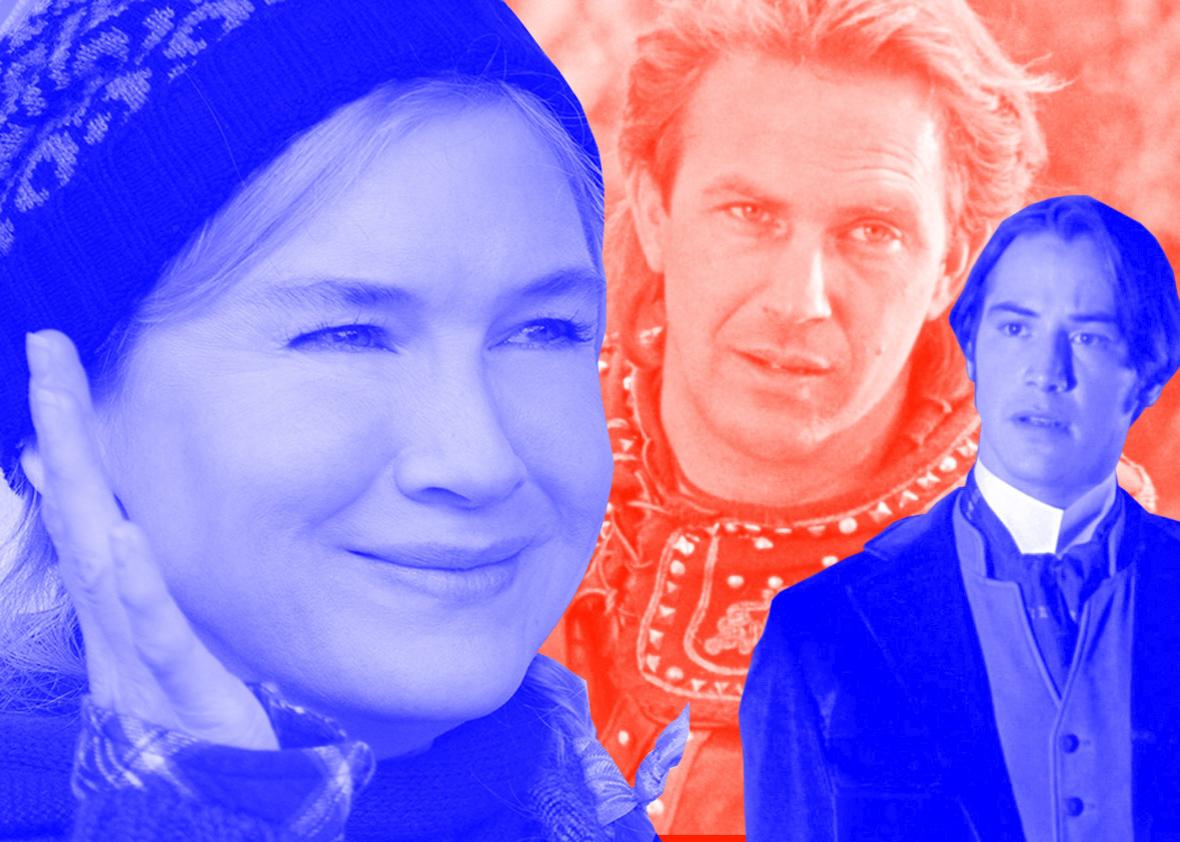Bridget Jones’s Baby opens this week, its trailers blanketing televisions at gyms across this great land. (I assume that the only time anyone watches an actual commercial on an actual television these days is at the gym.)
And in the midst of some recent half-assed work on the elliptical, I noticed that something seems very off about Renée Zellweger in this film. Just … not quite right, you know? Like, vaguely resembling its actual self, but still mutilated almost beyond recognition.
No, not her face, you patriarchal jerk—I’m talking about her fake British accent, which somehow, over the course of 15 years and three films, appears to have gone from ace to pants.
When the original Bridget Jones adaptation premiered in 2001, it caused granny-underwear-size shockwaves not just for its star’s monstrous weight gain (to the unheard-of size of many healthy human females), but also for the alleged authenticity of her dialect, which native Britons described as “bang on” and “impeccable.” In the intervening decade and a half, however, it appears that Zellweger has either switched dialect coaches or sacked hers altogether, and I fear Bridget Jones’s Baby will land the actress somewhere between a Costner and a Reeves in the annals of accent history—a bollocks designation to be sure, but one that places her squarely in the majority of her North American peers, when it comes to the seeming impossibility of faking vocal stylings from across the pond.
For quite unlike our friends over there—scores of whom each year invade our shores, stealing dozens of top jobs from our hard-working people, often undetected because they are so good at imitating our regions’ drawls, flat affects, and squashy R sounds—American actors’ British accents are generally rubbish. Why else would an entire industry be content to allow their dialects to sputter to a pathetic halt halfway over the ocean, resulting in the dread “mid-Atlantic” Joaquin-Phoenix-in-Gladiator genre? (See also: Peter Dinklage in Game of Thrones, Angelina Jolie in Alexander, Madonna in her everyday speech.)
But why? Why can they do us so convincingly, but when we try to do them, it always goes pear-shaped? For answers, I sought out Bob and Claire Corff, the husband-and-wife team of highly regarded dialect coaches who recently weighed in on the convincing American accents of some of our television’s interlopers. After a quick confab with his wife, Bob called me, and this is the explanation they offer.
Trained English actors, Corff explains, “learn very early on that if they can’t do standard American accents, they will not have an international career. A lot of their training is much more intense than the training in America. So they are studying movement, and they’re studying voice, and they’re studying accents, and fencing—they’re used to the idea of not being so good at something, working a long time, and becoming good at it.”
Since the “international” market is often the American market, our homegrown actors don’t have to perfect an American accent—so, often their training (if they even have formal training, which many of our discovered-in-a-school-play success stories do not) does not include dialects and accents.
Americans, Corff says, often “just can’t believe” that getting a new accent down “would be something that difficult that it would be a problem for them.” They’d be wrong. But again, this isn’t because—no matter what your friend from Wolverhampton tells you—the many British (and Irish, Scottish, and Welsh) accents are just that much harder than our many American accents. (The Kentucky accent seems pretty hard, for example—just ask Michael Rapaport.) It’s that mastering an accent takes a veritable shite-tonne of work. American actors, Corff said, “could do” British accents—but the parameters of their careers usually mean they’re “not as compelled to have to.”
That’s not to say there isn’t a small contingent of our countrymen and women who’ve managed to ape the Brits at, let’s say, McNulty levels of authenticity. (For what it’s worth, it is possible that my only—rather useless—talent is that I can always tell when it’s one of Them. Stringer Bell; Chuck Bass; Vampire Bill; Gunnar from Nashville; the hot cellist from Mozart in the Jungle; the creepy ginger from Homeland and Millions, who “plays American characters so often he forgets to speak in a British accent.” Ugh. You fer’ners never fooled me.)
Anyway, Corff—who admitted to hearing major errors even in the trailer for Bridget Jones’s Baby—had nothing but compliments for Gwyneth Paltrow, Robert Downey Jr. (in both Chaplin and Sherlock Holmes), and Johnny Depp (“He even has an English accent now, it seems, when I see him on interview shows”). And recently, indie fixture Lake Bell managed a definitely not-cringe-worthy accent in Man Up—though she’s famous for specializing in accents; In a World was basically a thinly plotted showcase for them.
Still, though, as we are at cricket, squash, and, apparently, not electing an authoritarian buffoon, Americans are still generally a bit wonky at British accents. And this is for the unsurprising reason that mastering them is hard and takes the kind of single-minded dedicated work that you only do when you’re still unfamous and hungry. Alas, by the time an American lands a part in a high-profile British role, she’s usually quite famous, and enough of a box-office draw that whatever accent she can manage is the one viewers get. Especially, it seems, if that production is the utterly uncalled-for second sequel in a franchise.
